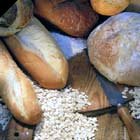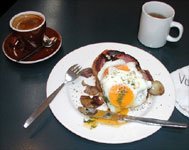Ok, bulking season is over and it is now time to get shredded...so you hope. Where do you start? What do you eat? If you are new to fat loss diets, this article is a must read. I have been planning since September to be in the best shape that I could be in by the time I left for my cruise in April.
I'm not huge or ripped, but I know the formula that works. During my entire bulking phase, I researched cutting so that I would do everything correctly the first time and I would not have any regrets when I was complete. It has now been about two months since I began cutting.
I started at 182 and I am now at 165. Originally, I was about 18.9% bodyfat, and now, I am at 12.5% and you can see the difference. What I write in this article is just some useful tips that are currently helping me lose bodyfat. Whether you choose to follow them or not is up to you. But I promise you if you follow even some of these points moderately, you will see changes that you are happy with.
This should not be considered a diet in the traditional sense. It should be considered a lifestyle. At first it's hard and takes some getting used to, but eventually you'll be able to eat more foods and your self-confidence will skyrocket, as did mine.

Brief Background

The first thing to keep in mind about going on a fat loss diet is moderation. YOU CAN EAT, but use your head. There is no reason for anyone to starve themselves on a diet. If you are terribly hungry, then you are doing something wrong and your diet needs a little modification. Whether you want to believe it or not, your body is programmed.
In some cases, it's smarter than you. If you abruptly terminate caloric intake, I promise you that you will not be satisfied with the effects. Your body goes into what is known as "starvation mode." The simplest way to explain this is that your body will be burning precious pounds of muscle and fat at the same rate.
Now, if you have worked so hard to achieve a decent amount of muscle, why would you want to look back and say, "Wow, I just wasted five months of bulking, and now after cutting, I look like a wet noodle!" Some people choose to begin their bodybuilding "career" with their cutting phase.
If this is so, you want to lose as little muscle as possible because when you cut the fat, you will actually have something underneath to show off. With that said, let's examine the most basic parts of the diet first. I hope to go more in-depth with the exercise program in future articles.
I would also like to give more insight into parts of the diet that need an entire article to explain.
Your body needs nutrients. I've watched so many people around me jump onto the Atkins and Southbeach diet bandwagon. I'm not saying that these diets do not work, but what is the point of denying your body of an essential nutrient such as carbohydrates? While my friends who are on the Atkins diet slop through their inefficient workouts, I have enough energy to complete two of their workouts after completing mine.
Carbs are your main source of energy and will fuel you throughout the day. I'm not only stressing the importance of carbs, but of all essential nutrients. Your body needs ALL types of nutrients in some sort of ratio that will be determined later on in the article.
So, what adds bodyfat?
Well, it's not actually that simple to understand. The basics of it are based on carbohydrates. Your body can use only a certain number of carbs per day. Overloading your system with carbs will inevitably trigger your brain to store these extra calories as fat.
Therefore, eating carbs is fine if you eat the right kinds and if you eat them in some sort of moderation. Who would have thought that it would take so many years for people to figure out that it's not actually the fat content in food that makes you fat?
So, how do you lose bodyfat?
Well, that's kind of simple. All you need to do is use more calories than you take in. This really isn't hard when you consider that your body burns calories on its own. My body is burning calories right now as I sit at the computer and type this article.
A simple 30 minutes of cardio a few days a week will greatly speed up your metabolism and burn those extra calories so you make sure that your body is using everything you put into it. The idea is to take in only the necessary amount of food for your body to operate properly and no more.

Basic Points

Eat At Least Six Meals A Day!
If you have the time to, try to get in seven or eight. Your body simply won't be efficient if you eat three meals a day with what you consider "small snacks" in between. By eating small meals more frequently, your body's metabolism greatly speeds up. Remember what I said about your body being smart.
When you eat small meals more frequently, your body is saying, "I better use these calories now because I'll have another equal batch coming in about two hours." For people on-the-go this can be very hard. A good idea is to invest in a protein bar that is fairly low in carbs.
One of the best tasting bars that I ever tasted was OneWay. So what is a small meal? Take someone who is 180lbs for example. This person needs 180 grams of protein a day, 144 grams of carbs, and 16 grams of fat per day (or a similar ratio). Divided among six meals, this would equal 30 grams of protein, 24 grams of carbs, and about 3 grams of fat per meal.
You Can Eat Carbs!
If your eating six meals a day, try to get all of your carbs in with the first three meals. This is something that I have found very effective. My third meal is around 3:30 PM. After this, I do not consume any carbs for the rest of the day. So, what kind of carbs can you eat? Stick to whole grains and brown carbs.
Brown rice, whole wheat cereals, oatmeal, and wheat bread are great choices. Stay away from any refined carbs. Refined carbs are the white ones such as white bread, white rice, and anything that contains sugar or flour. Refined carbs cause an "insulin spike."
 While I cannot get into detail about insulin (it would take another entire article) the general rule is the more steady the insulin level, the greater the fat loss. Insulin spikes can cause your body to store more calories as fat. This is why white carbs and candy are not good choices for dieters. Sugarless foods are a decent substitute.
While I cannot get into detail about insulin (it would take another entire article) the general rule is the more steady the insulin level, the greater the fat loss. Insulin spikes can cause your body to store more calories as fat. This is why white carbs and candy are not good choices for dieters. Sugarless foods are a decent substitute.
Most of these foods, such as sugarless syrup (a great choice for wheat pancakes or oatmeal), are made with sugar alcohols. These are considered on nutrition labels to be carbs, however they do not raise your insulin level. The basis for me believing this is because sugar-free items were made for those who have diabetes.
Having a stable amount of insulin in the body is the most important thing in their lives. Therefore if the sugar-free food is not harming them, then it is not raising our insulin levels to extreme heights.
Eat Protein!
Protein helps you grow. It is essential to your body. I mentioned earlier that it is important for you to try and retain as much muscle as possible. Protein is probably the most important factor in achieving this goal. When you train, your muscles are completely broken down and need to be rebuilt.
Protein is what rebuilds and replenishes your muscles. That's why a bag of chips is not a good choice for a post workout meal. Good sources of protein are chicken, lean red meat, eggs, and of course, protein powders.
My favorite protein powder is Optimum Nutrition's 100% Whey Protein. For .77 serving, it is very inexpensive and tastes great when mixed with milk. While protein and carbs are very important, fats must not be neglected. Fats are good for you, just stay away from too many saturated fats. A good tasting source of fats are peanuts.
Drink Water!
 You might be thinking, "Yeah, I drink 8 glasses of water a day I have this covered." WRONG! Yeah you can drink 8 glasses of water a day but it is more efficient to drink more. Your body is composed mostly of water and water is required for every cellular action in the body.
You might be thinking, "Yeah, I drink 8 glasses of water a day I have this covered." WRONG! Yeah you can drink 8 glasses of water a day but it is more efficient to drink more. Your body is composed mostly of water and water is required for every cellular action in the body.
By drinking a lot of water, you constantly provide enough water for these cellular transactions. Water is also very important for keeping your system clean and your kidneys free of debris. It is probably the most effective supplement that I can recommend.
I like to drink at least a gallon of water a day, and that is considered a bear minimum for me. Big deal, I pee a lot. You have to decide how bad you want it.
Eat In Ratios!
Most people will recommend 40/40/20, which means 40% of your calories coming from protein, 40% of your calories coming from carbohydrates, and 20% of your calories coming from fat. This is a very effective formula, however I have a relatively slow metabolism.
I tried the 40/40/20 approach, but saw much greater results with a 50/40/10 ratio. Basically, it's up to you and your individual body type. Trial and error are the best ways to find out the right equation. Try one for a few weeks and see what kind of results you get.
You can then tweak it from there. Just for your reference, one gram of protein contains four calories, one gram of carbs contains four calories, and one gram of fat contains nine calories. Do the math. You should eat no more than 10 times your body weight.
Cardio Time!
Ok how bad do you want this? I am currently doing cardio for 30 minutes a day for about 6-7 days a week. All that is necessary for the average dieter is 30 minutes of cardio about 3-5 times a week. The most effective time to do cardio is in the morning on an empty stomach because your body's glycogen stores will be very low and you will inevitably burn more calories from stored fats than from anything else.
You should perform you cardio at anywhere from 75-85% of your Max heart rate. This is achieved by subtracting your age from 220 and then multiplying by .75-.85. This is your target heart rate for your cardio.
Also do not neglect weight training. Weight training is necessary 3 to 4 times a week. The more muscle you build, the more fat you burn. It's that simple.
Eat Breakfast!
 Breakfast is the most important meal of the day. Overnight, your metabolism slows down and you obviously don't take in any nutrients. When you wake up from the 8 hours of sleep you should be getting, your body is begging or nutrients.
Breakfast is the most important meal of the day. Overnight, your metabolism slows down and you obviously don't take in any nutrients. When you wake up from the 8 hours of sleep you should be getting, your body is begging or nutrients.
Make sure you provide it with a healthy source of proteins, fats, and carbs. This will help by giving your metabolism a jump start that will last well into the day.

Conclusion

These are only the basics of fat loss. I hope to write more articles that get a lot more in depth than this one. There are many different supplements that are effective for losing weight and I wish to share which ones have provided the best results for me.
This is not a fool proof plan, but it is the only regimen that ever worked for me. How strict you are with your cardio and diet reflect how bad you want to see results. I also want to remind you not to rush anything. You can't lose fat overnight. It's just not possible.
Aim for 1-2 pounds of fat a week. Buy some bodyfat calipers so you can track your progress and make sure that the pounds you are losing are pounds of fat and not pounds of muscle. Bodyfat calipers are your best tool for dieting, not scales.
A scale does not accurately portray water weight. Muscle also weighs more than fat so if you lose fat and gain muscle simultaneously, you will see no change in the number on the scale. Good luck and train hard.
Fat Loss 101: Part Two!
